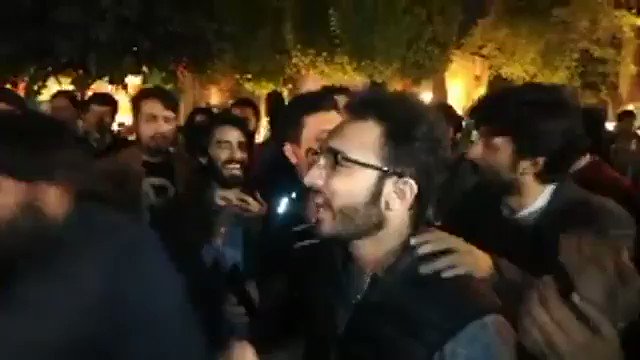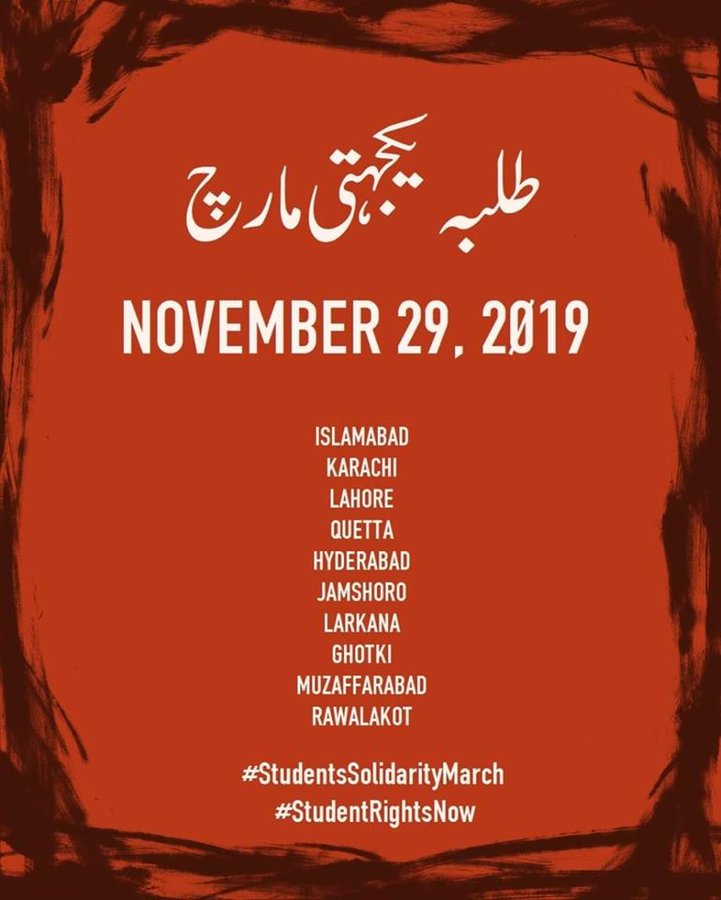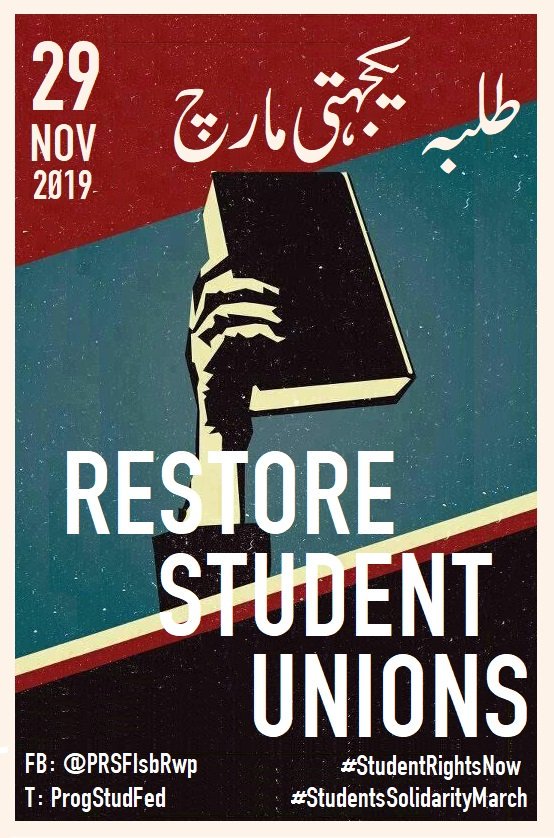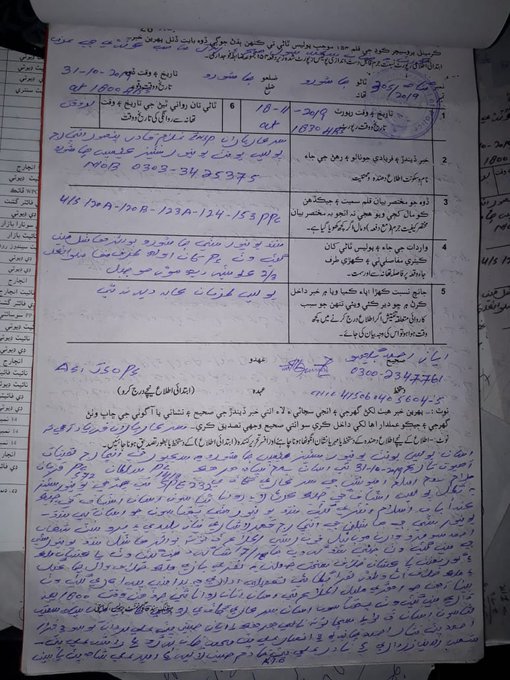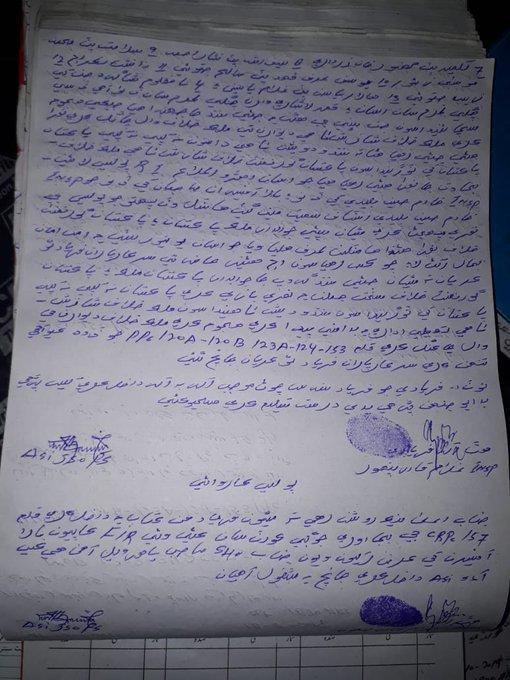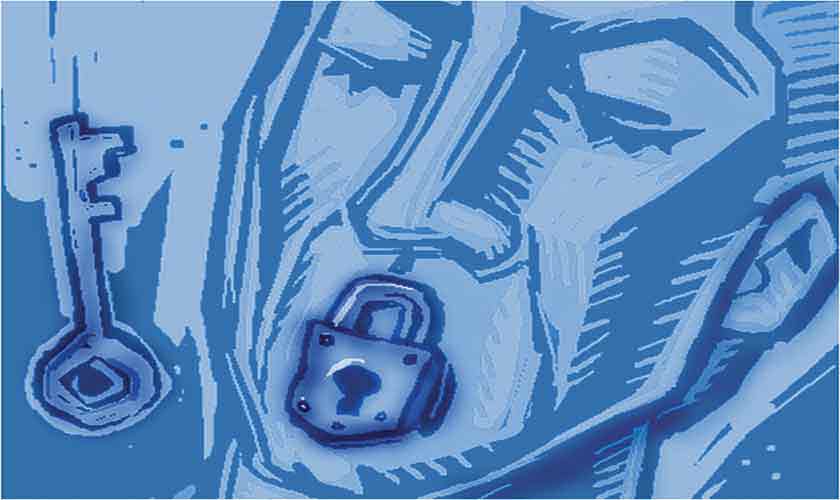M WAQAR..... "A man's ethical behavior should be based effectually on sympathy, education, and social ties; no religious basis is necessary.Man would indeed be in a poor way if he had to be restrained by fear of punishment and hope of reward after death." --Albert Einstein !!! NEWS,ARTICLES,EDITORIALS,MUSIC... Ze chi pe mayeen yum da agha pukhtunistan de.....(Liberal,Progressive,Secular World.)''Secularism is not against religion; it is the message of humanity.'' تل ده وی پثتونستآن
Saturday, November 23, 2019
Why students in Pakistan, like in JNU, are raising azadi slogans
TARAN DEOL
A video of Pakistani students raising ‘azadi’ slogans has gone viral. The same chant was used three years ago by former JNU student Kanhaiya Kumar.
As students of Jawaharlal Nehru University (JNU) in New Delhi are protesting against a steep hostel fee hike, their counterparts in Pakistani universities seem to be mirroring them.
A video of some students of Pakistani universities chanting ‘azadi’ slogans went viral on social media a few days ago. They were protesting at the Faiz Literary Festival held on 19 November in Lahore.
Leadership looks like this. #Azadi but let me clarify the Faiz here means Faiz Ahmed Faiz the poet. #studentpower
291 people are talking about this
Azadi chants were raised in India, too — in 2016 by former JNU student and CPI leader Kanhaiya Kumar and others.
The students at the literary festival in Pakistan were protesting against alleged government interference in colleges, fee hike, budget cuts and lack of student housing. The students are demanding the restoration of student unions, “de-securitisation” of campuses, end to harassment, among others.
“There have been budget cuts in the public education sector, which means no scholarships, fee hikes, raised costs of transportation, etc,” Tooba Syed, a Pakistani student and activist, told ThePrint.
The students seen protesting on 19 November are members of the leftist Progressive Student Collective. A bigger protest — Student Solidarity March — has been planned on 29 November to be organised by Progressive Students’ Federation (PRSF).
Don't just say 'I wish these students well' and 'I hope they are successful in their struggle.' Come out and stand with them on November 29th and help amplify their voices! #StudentsSolidarityMarch
72 people are talking about this
“The marches that will be held across the country are for students’ right to unionisation, and free and quality education for all, among other demands,” said Syed.
“We are marching against the system which labels us as ‘Terrorists’ for demanding clean water on campus. Puts us behind bars for opposing the dictatorship of administration on campus. We demand our right to exist with dignity,” PRSF tweeted.
We are marching against the system which labels us as "Terrorists" for demanding clean water on campus. Puts us behind bars for opposing dictatorship of administration on campus. We demand our right to exist with dignity.
Poster By: @jaquelintzin#StudentsSolidarityMarch
18 people are talking about this
The PRSF was referring to an incident this week in which at least 17 students of Sindh University, Jamshoro, were booked under sedition charges for allegedly raising anti-Pakistan slogans.
13 University of Sindh Jamshoro students including 4 @ProgStudentsFed members, have been charged with sedition for protesting for clean water. This criminalization of students, especially in Sindh & Balochistan, is unacceptable. #StudentsSolidarityMarch #StudentRightsNow
142 people are talking about this
Similar protest held last year
While the video of the 19 November protest has garnered a lot of attention on social media, this is not the first time such as protest was held — a similar protest was held last year in 16 different cities.
According to a report in the Asian Marxist Review, several progressive student organisations from all over Pakistan formed Student Action Committee to demand the restoration of student unions, representation of students in management and increase in the education budget.
According to the students, the Imran Khan-led PTI government had left “educational campuses and students abandoned, dejected and directionless”, the report stated.
#Pakistan - Media under attack
Imdad Soomro & Saleem Jhandir
Ashiq Jatoi, a senior journalist representing a TV channel, Sindh TV, had never thought that while reporting on miseries of the poor, kidnappings and police encounters, he would himself become a victim one day. He was named in several criminal cases, including terrorist activities and attempted murder.
On July 30 this year Jatoi, and his five journalist friends — Rutam Indar, Altaf Kalwar, Mubeen Indhar, Junaid Kalwar and Hazrat Gul Pathan — were attacked by about a dozen unidentified people, some of them masked. They were beaten brutally in front of hundreds of people before being taken away to an unknown place.
Jatoi and his friends remained in illegal confinement for many hours before they were taken to Pano Aqil police station, where a first information report (FIR) was lodged against them under the Anti-Terrorism Act (ATA). Cases were also registered against two other journalists — Shair Samejo and Irshad Rutam. An 18-year son of Rutam Indar, who visited the police station to inquire about the journalists, was also named in the same case registered on the complaint of one, Abdul Ghaffar Chahcar.
The next day, Pano Aqil police presented the seven accused before the Anti-Terrorism Court for their physical remand. The court disallowed the prosecution’s plea and removed charges of terrorism and referred the case to the district and sessions court which granted bail to all of them.
On November 4, Jatoi was again abducted from his home by unidentified people. This time he was taken to a police station in Rohri, in district Sukkur after the passage of 10 hours and an attempted murder case was registered against him. The complainant in this case was Hafiz Abdullah Chachar, cousin of Abdul Ghaffar Chachar, the complainant in the previous case. Jatoi remains locked up in Sukkur Central Jail.
Jatoi tells TNS that in the first instance he was abducted in Pano Aqil when he was on his way to his office along with other journalists. Some of the kidnappers were masked. He says they were beaten brutally at a private place and the beating was recorded on video before handing them over to Pano Aqil police. He believes he was targeted due to his reporting on smuggling of Iranian oil by local landlords in collaboration with the police.
Akhlaq Jokhio, a journalist associated with a local newspaper, was implicated in a fake case under ATA by Naushero Feroze police and sent to Sukkur Central Jail. The case was later proved fictitious and Jokhio was released after remaining in prison for seven months.
Over recent months, cases have been registered against around 50 journalists. Some of them accused of heinous crimes, including terrorism and kidnapping for ransom. Most of the cases have been registered in Sukkur. Ironically, the Supreme Court of Pakistan has directed the police recently, not to implicate those accused of other crimes under anti-terrorism provisions.
Dr. Kaleem Imam, the Sindh police, inspector general, tells TNS that the practice of implicating journalists in anti-terrorism cases is unacceptable.
He says he has issued directions to the police to not arrest any journalists in an anti-terrorism case. “The cases registered in the past would be withdrawn. In this regard, I have directed the deputy inspector general (DIG) in charge of investigation to look into the matter and withdraw the cases and remove the anti-terrorism sections immediately,” he adds.
Imam says that in cases where complaints were brought by private persons and which later proved fake, action would be taken against the complainants according to relevant laws.
The list of victims is quite long. In Pano Aqil, Nadeem Bozdar, associated with a national TV channel was abducted from his office on September 6 by masked men. Bozdar was missing for 24 hours before his arrest was reported at Kot Sabzal police station, in district Rahim Yar Khan in an extortion case.
Following a nationwide protest by journalists, Bozdar was brought back to Sukkur where SSP Irfan Samon released him claiming that he had been picked up by Punjab Police mistakenly. Bozdar tells TNS that he was kidnapped from his office by masked men who took him to Kot Sabzal police station where he was mentally tortured and warned against filing news against the police.
Journalists from all over Sindh protested in front of the Sindh Assembly against on September 19 and, staged a sit-in for many hours. Leaders of the opposition and treasury benches visited them and assured them of that their issues would be resolved.
In another incident on September 12 in Thatta district, Peeral Piasi, a journalist associated with a local newspaper was nominated in a case under Anti-Terrorism Act at Mirpur Sakro police station. The police did not disclose this to his colleagues despite repeated queries.
In Thal district of Jacobabad six journalists associated with the national media — Musa Baloch, Zafar Khoso, Razak Abro, Moosa Sarki, Mukhtiar Dol and Abbas Mastoi — were nominated in anti-terrorism cases for trying to report on mismanagement and corruption at a local government hospital. They were later granted bail by a court.
Journalist Ajeeb Lakho, associated with a local newspaper of Khairpur district, was nominated in nine cases of terrorism, kidnapping for ransom, and dealing in narcotics along with his relatives. When local journalists, and relatives, protested in front of Gambat Press Club, the police lodged an FIR under Anti-Terrorism Act against 60 people, including seven journalists.
After Lakho approached Sindh High Court against the registration of cases against him and his family members. Court, directed the police not to implicate him in any criminal case without prior permission of the court. Since that order was passed four more cases, including a kidnapping for ransom charge, have been registered against him at various police stations of the province.
Ghazi Jhandir, the president of Sindh Journalist Council (SJC) who had given the strike call against the terrorism cases against journalists tells TNS that despite their protest in front of the chief minister and other authorities the practice continues.
“In July, chief minister Murad Ali Shah, ordered a fact-finding committee to report on the issue within ten days but despite the passage of several months, no progress has been made,” Jhandir adds. He says that after the CM’s orders for an inquiry, eight more journalists were nominated under Anti-Terrorism Act.
Jhandir says the journalist community is not above the law but no person, including journalists, should be held in a false case alleging heinous crimes. He says the police officials filing false cases should be given exemplary punishments.
The head of the fact-finding committee formed by chief minister, Musadiq Khan, the secretary energy, tells TNS that the committee has done its work and the draft is ready. It will be submitted to the chief minister after vetting by committee members.
Pakistan Federal Union of Journalists (PFUJ), President Afzal Butt, says implicating journalists in false cases, including terrorism and kidnapping for ransom, is wrong and a new way of curbing the freedom of expression. “This injustice is in the knowledge of the PFUJ. A strategy will be made in this regard in the upcoming meeting of the PFUJ.”
Pakistan witnesses 102 polio cases in 2019
A day after five cases in Sindh and KP, two more cases emerge in Upper and Lower Kohistan
The total number of polio cases across the country has touched 102, including nine vaccine-derived cases after two cases were reported in Upper and Lower Kohistan, Khyber Pakhtunkhwa.
In spite of tall claims by the government and several anti-polio drives, there has been no let-up in the polio cases across the country, as only yesterday five cases were reported in Sindh and KP. These two provinces are among the worst-affected regions, witnessing a spike over the recent months.
Poliovirus was found in the sample of a girl child in Tehsil Pattan of Kohistan. Her samples were sent to the national institute of health in Islamabad on October 27. Similarly, the same virus was found in a five-year-old girl child in Tehsil Dasu of Upper Kohistan.
FIVE CASES IN SINDH AND KP:
On Friday, three cases were recorded in Sindh and two in Khyber Pakhtunkhwa. The first case was a 36-month-old female from Sakran in Shaheed Benazirabad, Sindh. She had received three doses of routine immunization and seven doses of supplementary immunization.
The second case was a 12-year-old male from Karachi’s Keamari Town. He had received three doses of routine immunization and seven doses of supplementary immunization. The third case was a three-month-old female from Lakki Marwat in Khyber Pakhtunkhwa. She had received no polio drops.
The fourth case was a 30-month-old female from Kotri in Jamshoro, Sindh. It is not clear whether she received any dose of the polio vaccine. The fifth case was a 10-month-male from Wazir in Bannu, Khyber Pakhtunkhwa. His immunization record was incomplete.
According to an Emergency Operation Centre (EOC) for Polio: “Lakki Marwat and Bannu have become high-risk districts for polio cases in 2019, as 15 and 24 polio cases were reported in both the districts, respectively. Polio cases from Lower and Upper Kohistan have been reported for the first time this year.”
This week, the Gates Foundation pledged $1.08 billion and, along with other development partner organizations and governments, the meeting got total pledges worth $2.6bn, including $160 million announced by Dr. Mirza on behalf of Pakistan to eradicate polio in the world.
Polio remains endemic only in Pakistan and Afghanistan. The number of wild poliovirus cases stood at 77 in Pakistan and at 19 in Afghanistan as of Oct 29 this year. The corresponding figures during the same period last year were six for Pakistan and 19 for Afghanistan. However, the authorities show resolve, again vowing to enhance their efforts.
“We have conveyed to the international donors that we are developing consensus among all provinces to enhance our vaccination campaign with a new strategy. We need to give new confidence to the entire team as we had controlled poliovirus in the past and we can do it again.”
#Pakistan - #LAHORE’S AQI WORST IN THE WORLD ONCE AGAIN
PUNJAB CAPITAL’S AIR QUALITY HITS 335, LEAVING RESIDENTS SCRAMBLING TO OVERCOME THE HAZARDOUS SMOG
Lahore, the provincial capital of Pakistan’s Punjab province, on Thursday once more topped global rankings for the city with the worst air quality, with monitors showing an average ‘hazardous’ Air Quality Index of 335.
Residents of the capital of Pakistan’s most populous province woke up again to the sight of a haze covering their city, with residents complaining of sore throats, itchy eyes and other ailments linked to inhaling toxic material through the smog that has increasingly become a regular fixture.
While the average AQI for the entire city stood at 335 around noon, parts of the city with individual air quality monitors showed the figure rising as high as 763, which posits a PM2.5 of nearly 900 ug/m3—the equivalent of smoking nearly 40 cigarettes.
While smog is not a new phenomenon in Pakistan, it has taken on greater urgency this year amid ever-worsening air quality that is particularly unhealthy for children, the elderly and the infirm. In 2007, the Lahore High Court ordered authorities to prepare a smog response action plan to overcome the health crisis. The Punjab Environment Protection Council, however, adopted a plan that utilized a modified AQI classification system, which claims a PM2.5 rating of 60 is ‘satisfactory’ even though the U.S. AQI adopted by much of the world declares it ‘unhealthy.’
PM2.5 refers to atmospheric particulate matter that has a diameter of less than 2.5 micrometers, so small that they can only be detected with an electron microscope. These fine particles, which can come from various sources including power plants, motor vehicle emissions, and agricultural burning, last longer in the air than heavier particles. This increases chances of them being inhaled by humans and animals, where they can bypass the nose and throat and penetrate deep into the lungs. The air pollution worsens during winter, emerging as smog, due to temperature inversion, which produces a layer of warm air that traps air pollutants.
Experts and observers have urged the government to adopt a more robust plan to tackle smog, including shutting down schools when the smog levels reach hazardous levels to prevent children from suffering the worst effects.
It is advised that so long as smog persists, the elderly, children and the infirm should stay indoors with the windows closed. Doctors also say people who feel the affects of smog should drink plenty of water, rinse out their eyes at least once an hour, and wear face masks if they have to travel outside.
https://www.newsweekpakistan.com/lahores-aqi-worst-in-the-world-once-again/
https://www.newsweekpakistan.com/lahores-aqi-worst-in-the-world-once-again/
